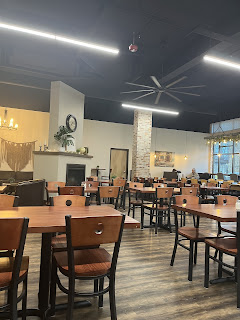Poindexter & Historic Brass
This week I finally was able to obtain the namesake of this blog: a cortado! For those of you who aren't familiar, a cortado is an espresso based beverage. It typically is an equal ratio of milk to espresso, steamed to a cooler temperature and less foamy than a cappuccino.
I was able to snag this at Poindexter Coffee, which is another great option for coffee close to Voxman. This is my favorite shop in town to study or get other work done. Poindexter is relatively quiet and has plenty of seating. Importantly - it also has ample access to outlets!
This trip I also made an important discovery alongside my friend Sara (who sadly is not a brass player with a blog, but she does run a pretty rocking bassoon reed business). After 3 PM Poindexter stops serving breakfast items, and instead offers a full menu. We split some tater tots & loaded fries, not the most conventional coffee pairing but perfect for a midday pick me up.
Similarly to our detour away from conventional coffee pairings, this week I'm going to stray a little from my usual content of brass ensemble music featuring the horn. This past week in class, we discussed early brass ensemble music from the late Renaissance to the 19th century. The recordings we listened to featured a mix of performances on modern and period instruments. This inspired me to share some of my favorite recordings featuring period instruments.
To kick it off, we have this recording of a cor de chasse consort. These hunting horns are the predecessors to the horns that would eventually become our modern double horns. The vibrato can be strange to our modern ears, but these were originally designed to be played on horseback so it probably was even wider back in the day! These consorts are still very prevalent in Europe (you can find a plethora of recordings by searching for cor or trompe de chasse on YouTube) and there are even local performance competitions.
Next is this performance of O vos omnes by Tomás Luis de Victoria (1548-1611). This is performed by The English Cornett and Sackbut Ensemble who we listened to in class. Tomás Luis de Victoria was a leading Spanish composer of the Renaissance who I first heard of because of this recording. He is often compared to Palestrina (who according to legend saved music in the Catholic church, no big deal). As an aspiring collegiate educator, I love finding music like this which can be incorporated into our brass curriculum to expand our students' music history knowledge.
Last, and most certainly not least, is my favorite brass recording of all time (linked here). This recording is of Douglas Yeo performing an arrangement by Clifford Bevan of Tchaikovsky's 1812 Overture on 26 serpents. The original performance included 57 PLAYERS if you can even imagine that!







Kristen, I love the idea of combining coffee and brass music. It made me think of this piece Alan Ferber wrote that Atlantic Brass Quintet recorded. He didn't really have a name for it, but it was high energy, so I asked my colleagues what the name of the most expensive coffee in the world was, and we named it after that - Kopi Luwak. https://youtu.be/-NreCh4wVPc
ReplyDeletePoindexters is a hidden gem! Thank you for introducing me to the cor de chasse!
ReplyDelete